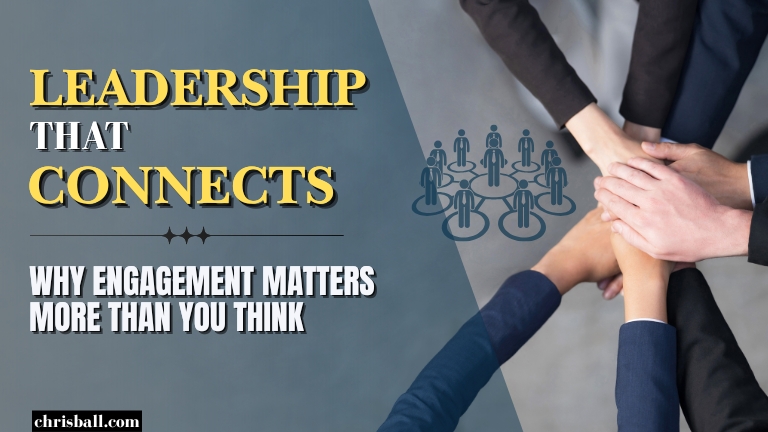Clive Woodward didn’t just lead England to a Rugby World Cup. He built a team that wanted to win together. Not because he barked orders or created a strict hierarchy—but because he made them care. About the work. About each other. About the whole thing.
This wasn’t luck—it was leadership built on engagement.
Let’s talk about what that really means.
Showing Up Is Not the Same as Buying In
You can force people to show up. You can’t force them to care.
Woodward knew that. He didn’t want a team that turned up, did the drills, and clocked off. He wanted players who were all in—mind, body, and spirit. And he worked to create the kind of culture where that could happen.
Ask yourself: do the people around you want to be there? Or are they just showing up because they have to?
If you want better results—at work, in sport, in life—start there.
Make It Hard. Make It Fun.
Woodward didn’t go easy on his team. Training was tough. Players were pushed hard. But—and here’s the clever bit—he also made it fun. Sessions were packed with variety, game-like drills, and friendly challenges. People wanted to turn up. They didn’t dread it.
This approach works because humans are wired for challenge—but we’re also wired for play. You can stretch people, but you can’t snap them. Too much pressure with no fun? Burnout. Too much fun with no challenge? Boredom.
Get the mix right and people don’t just perform—they thrive.
What could you do tomorrow to make your team’s day a bit more enjoyable?
Ownership Beats Obedience
Woodward introduced something he called “Teamship.” It meant every player had a say, and every voice mattered. People weren’t just told what to do—they were part of the decision-making process.
Why does that work? Because when people help build something, they’re more invested in it. When they feel ownership, they take pride in the outcome.
Think about your team. Do they feel like passengers—or drivers?
If people feel they’re just doing someone else’s job list, you won’t get their best. Give them a role they can own, and everything changes.
Don’t Forget the Human Side
Leadership isn’t just about processes and plans. It’s about people.
Woodward made time to build real relationships with his players. He didn’t treat them like machines. He checked in, showed interest, and built trust. His players knew he had their backs—on and off the field.
You don’t need to be everyone’s best friend. But if you want people to follow you, they have to believe you care. And they’ll only believe it if you actually do.
A quick question: when was the last time you asked someone on your team how they were doing—and really listened?
Work Hard. Rest Hard.
Woodward pushed his team, but he also protected them from burnout. He gave them downtime, space to breathe, and time to bond.
It sounds obvious, but a lot of leaders miss this. They focus so hard on goals that they forget about energy. Rest isn’t a reward—it’s part of the plan.
If your team looks tired, they probably are. Build in the breaks. Protect the fun. You’ll get more from people when they’re not running on empty.
Why Engagement Matters
When people are engaged, they don’t just complete tasks—they care about the outcome.
They show up early. They go the extra mile. They support each other when things get tough.
That’s what Woodward built with England. And that’s why they won.
If you’re in a leadership role—or want to be—it’s worth asking:
- Does my team feel excited to be part of this?
- Do they feel seen and heard?
- Am I creating a culture that energises them—or just gets the job done?
This kind of leadership isn’t flashy. It’s not about being the loudest voice in the room. It’s about building a place where people want to give their best.
That’s what Winning The Game is all about. Creating systems, strategies and environments that bring out the best in people—yourself included. If you’re interested in becoming a better leader, building stronger teams, or simply making your work life more enjoyable and productive, this book is for you.
Because leadership isn’t about shouting at people to do more. It’s about building something they’re proud to be part of.
And when you do that, the results speak for themselves.
